Mental health, race and how Black therapists work to help more Black patients in Madison
Anesis Center for Marriage & Family Therapy and New Beginnings Counseling Center seek to build trust and community as they provide mental health services for Black patients struggling to overcome racism and generational traumas.
By Murv Seymour
May 29, 2024 • South Central Region
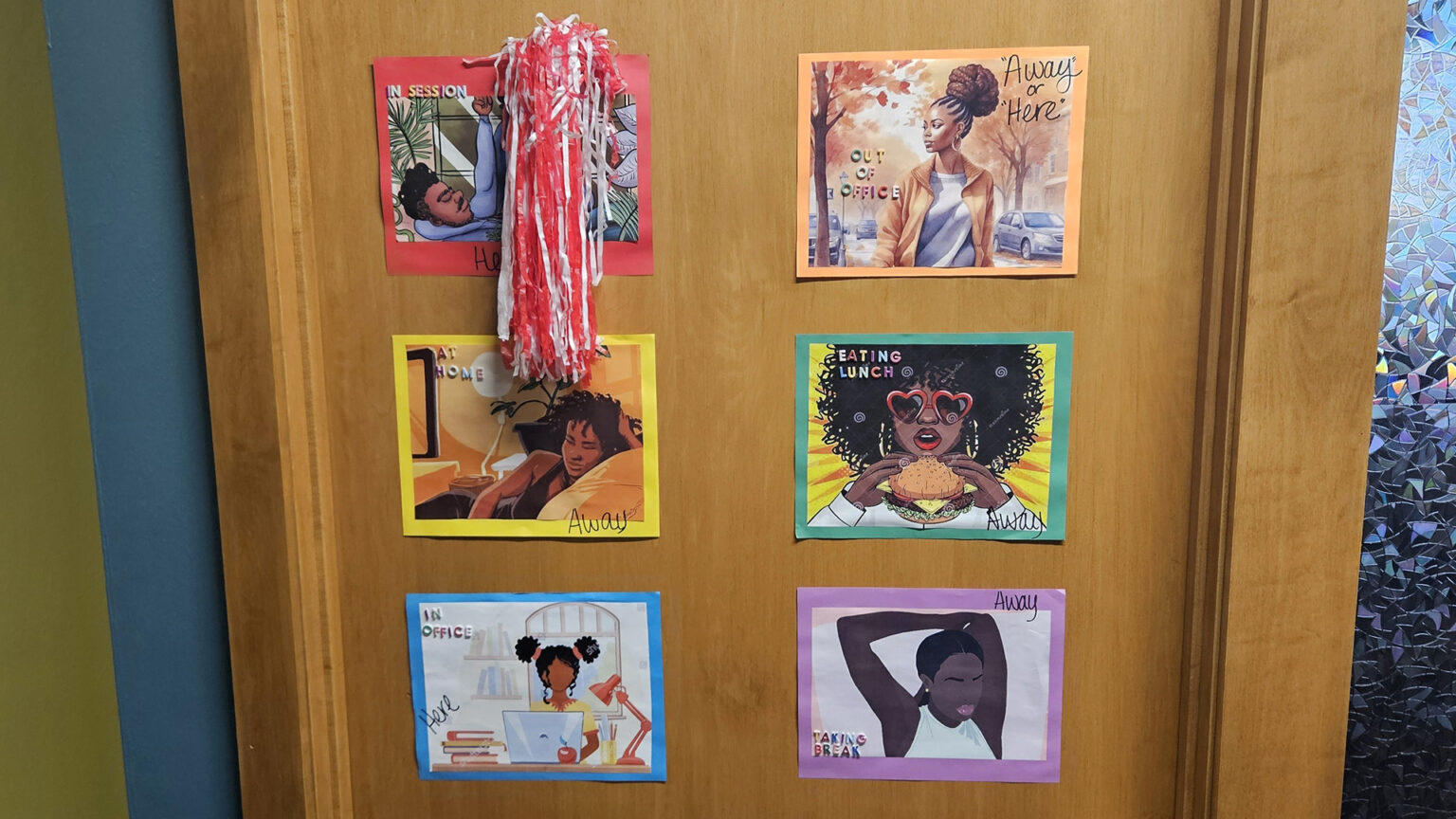
Signs on a door at New Beginnings Counseling Center mark activities of staff. The Madison-based therapy clinic employs a diverse group of treatment teams to provide mental health services for diverse populations. (Credit: Murv Seymour / PBS Wisconsin)
A bittersweet trend complicates the often-complicated journey toward mental and emotional wellness for Black residents of Madison. The good news is that more are reaching out in search of mental health treatment. On the flip side, the wait to receive counseling is unprecedentedly long and often stressful for those seeking help.
For Black people in Madison who need a therapist who looks like them, the wait is considerably longer than it is for those who are white and seeking therapy. This difference is simply because there aren’t enough Black therapists to go around. Black therapists say Black patients universally want to talk about struggles centered around race.
“Our wait list had grown to 800 people, prompting us in mid-January to temporarily pause new admissions,” said Myra R. McNair, executive director and owner of Anesis Center for Marriage & Family Therapy.
McNair estimated eight to 10 calls come into her therapy center every day from people who are often looking for a non-white therapist. The demand has forced some to wait half a year and, at times, as long as eight months.
Before the outbreak of COVID-19, McNair said they routinely were able to schedule new patients within about two weeks. Like many other irregular events, the pandemic led to a greater demand. Four years on from the start of the COVID-19 pandemic, Anesis has whittled its waitlist to about 375 people.
Anesis is ensuring its services reach beyond its west and north Madison offices. To help people cope while waiting and to help those who lack the resources for treatment, the center hosts free treatment at Mt. Zion Church on Madison’s south side. These four-hour drop-in sessions are held on Tuesdays and Thursdays, and are offered to anyone who shows up.
McNair said Madison’s south side represents a meaningful and historical space for Black communities in Madison.
“By establishing a drop-in clinic in this area, near landmarks like One City, the Black Business Hub, Urban League, and the Boys & Girls Club, we’re able to meet people where they are and provide accessible mental health support to those who may need it most,” she said.
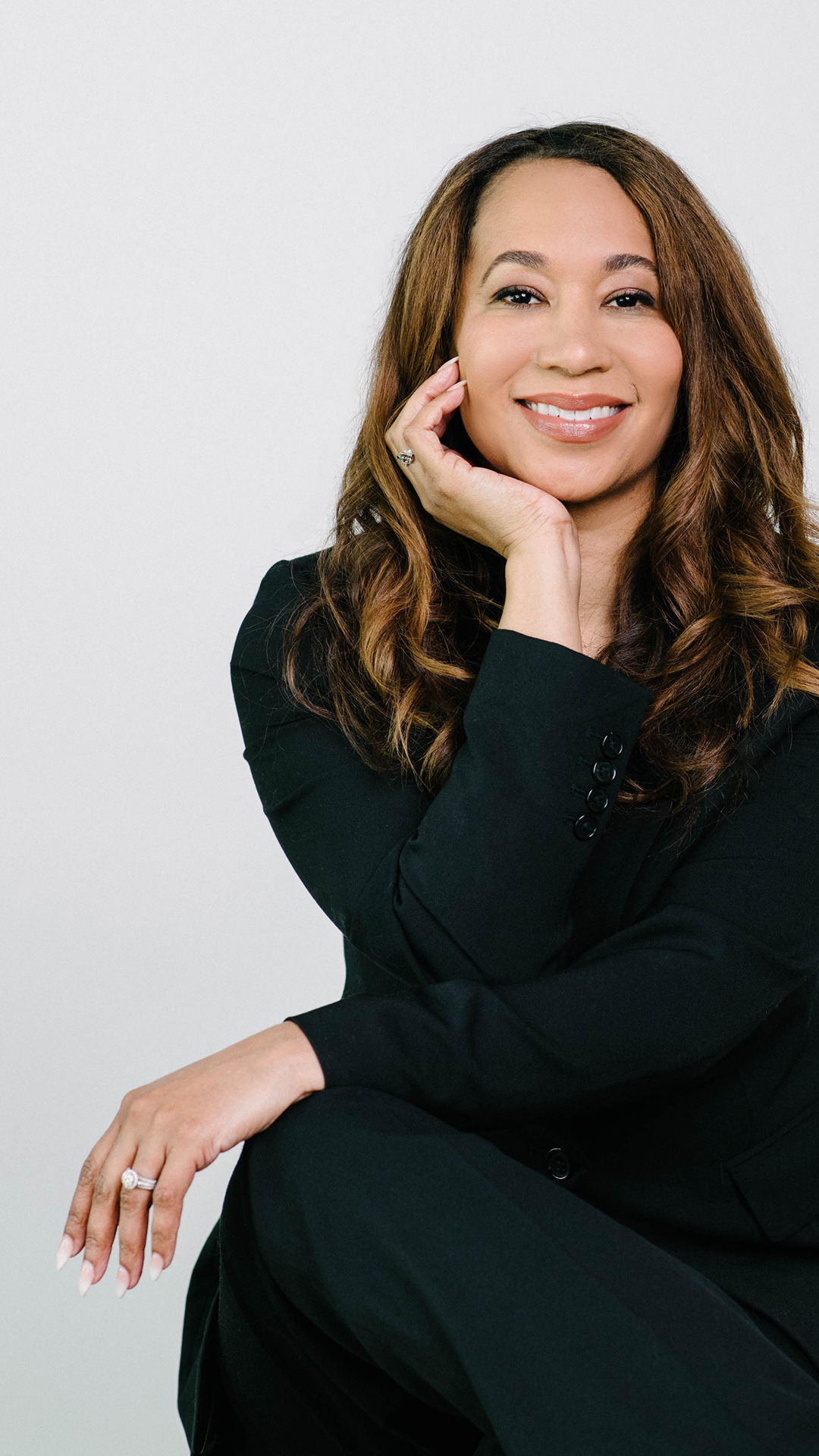
Myra R. McNair is the owner and executive director of Anesis Center for Marriage & Family Therapy, a Madison-based therapy center that specializes in providing services for patients from diverse backgrounds. (Credit: Courtesy of Myra R. McNair)
Anesis and New Beginnings Counseling Center, also based in Madison, have both have built diverse treatment teams to specifically cater to the treatment of Black and marginalized populations in the region.
“We’ve made it a priority to bring in therapists and leaders from diverse backgrounds, including Latinx, Asian and Indigenous communities. It’s about making sure that everyone who walks through our doors finds a place where they belong,” McNair said.
Anesis has an approximately 60-person staff, including therapists, case managers, care team coordinators, psychiatrists and administrative support.
The treatment team at New Beginnings is much smaller, but its unique counseling center is continuing to grow with a focus on welcoming diverse patients. Frederick Harris, its owner and executive clinical director, opened the counseling center in 2017 and manages a staff of about 10 people.
The Chicago native said he was on his way to law school when he took a job at a maximum-security prison in Ohio, working with primarily Black men who were incarcerated. He noticed many of the men had mental health issues that were being ignored by the prison system.
“Most of the people in the prison system were white. So, white social workers, white females, and they weren’t getting the mental health that they needed,” Harris said.
The experience inspired him to commit to a career in addiction and mental health treatment. Harris said when he moved to Madison, he saw an opportunity to help Black men struggling to find a Black therapist.
“A lot of the individuals in Wisconsin of color were avoiding therapy because they were getting retraumatized in therapy,” he said. “They could not find anyone that can actually represent them.”
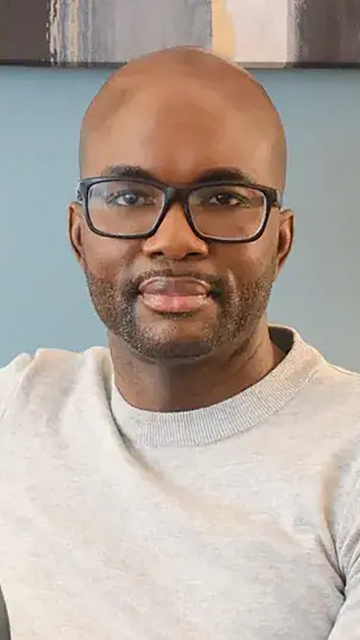
Frederick Harris is the owner and executive clinical director of New Beginnings Counseling Center in Madison. Harris pursued a career in mental health treatment to help provide therapy to people of color. (Credit: Courtesy of Frederick Harris)
The interior design of New Beginnings purposefully highlights Black culture in a distinct way on every wall and corner. From colorful paintings, featuring portraits of Afrocentric people, to a plethora of books with Black-themed titles laid out on tables in the waiting areas, it’s a space that seeks to help marginalized clients feel at home from the moment they step in the spacious offices. Even therapy dolls on shelves in a conference room that doubles as a meeting space for group therapy are diverse in their racial makeup and gender identity.
LB — a pseudonym — is Black and a patient at New Beginnings. She has been receiving mental health therapy since the early 1990s. After nearly 20 years of seeing a white therapist, LB felt it was time for a new start with a Black therapist. She began receiving treatment at the center in 2017, shortly after Harris opened its offices.
“It’s reminded me that it’s not just me,” LB said. “It’s not my imagination in that the racial trauma is real, especially as a Black leader in this community.”
LB said she has come to understand it will take time and therapy to help heal her past.
“We carry our grandfathers’ and their grandmothers’ trauma that they experience. And they carry their grandmother and grandfather’s trauma that they experience,” she said. “It’s going to take many, many, many more generations before we are really born into this world without any trauma.”
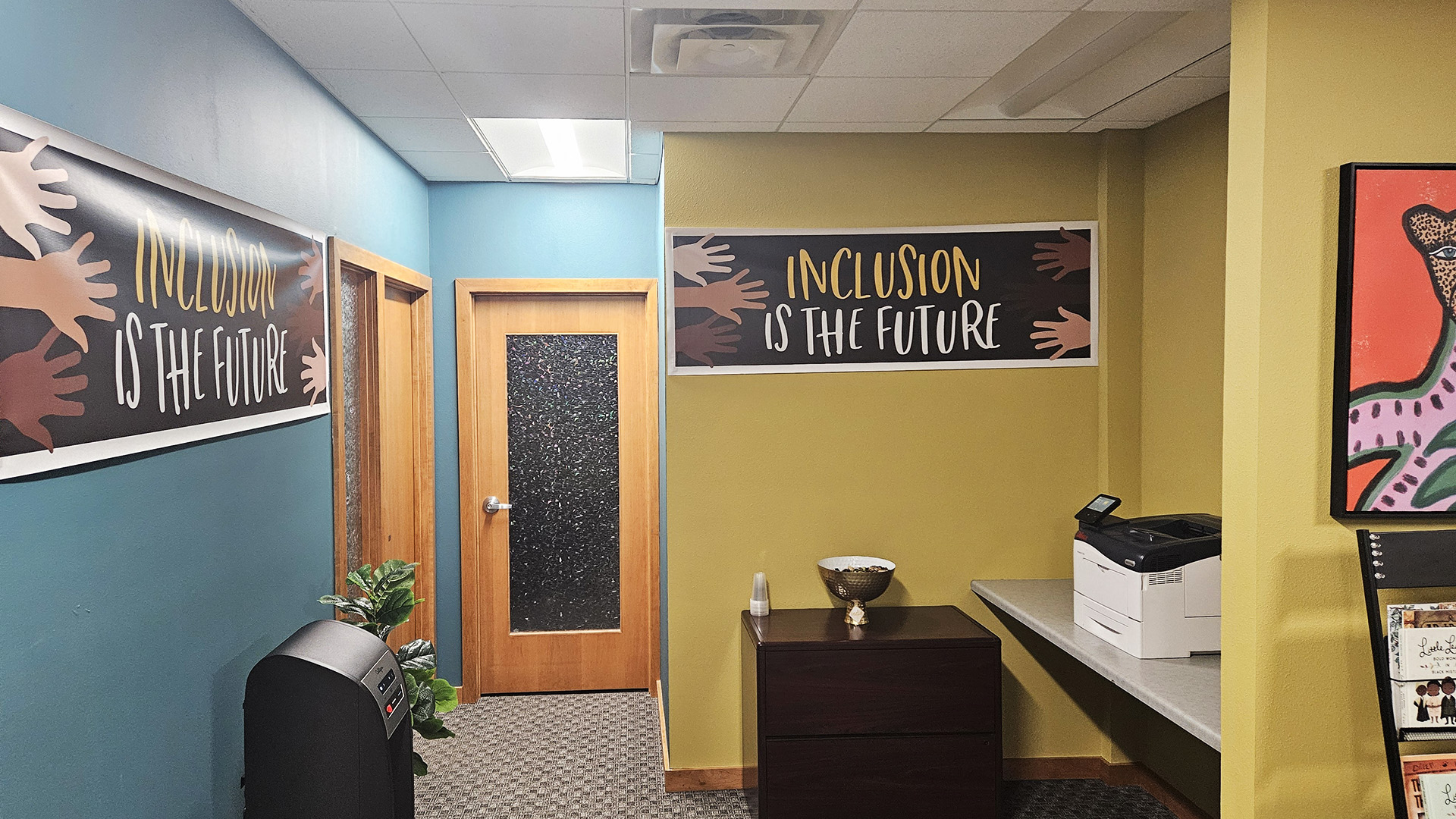
The decor at New Beginnings Counseling Center in Madison is intended to highlight Black culture and help diverse clients feel more comfortable in the space. (Credit: Murv Seymour / PBS Wisconsin)
Historically, many Black people have been hesitant to seek mental health treatment because of a cultural stigma, lack of trust in the health care system, systemic racism, lack of medical insurance, and a lack of cultural competence from some providers.
“Most of the theories we learned in school and grad school, and all these trauma-informed cares — they’re all studied on white males. So we come out, and then they’re practicing them on a person who’s Black, a person who’s Asian, a person is Puerto Rican, and is not effective,” Harris said.
McNair and Harris both said many of their Black patients are getting counseled on a lot of issues surrounding race, including challenges like workplace stress and microaggressions, community and belonging, and generational trauma. Some will travel from hours away to be seen by a Black therapist.
“Being a Black person in a predominantly white city like Madison can sometimes feel isolated and lonely — and we are a communal people. We long for that sense of connection, that feeling of being seen and understood,” McNair explained. She added that therapy becomes a safe space to vent frustrations and process experiences of discrimination.
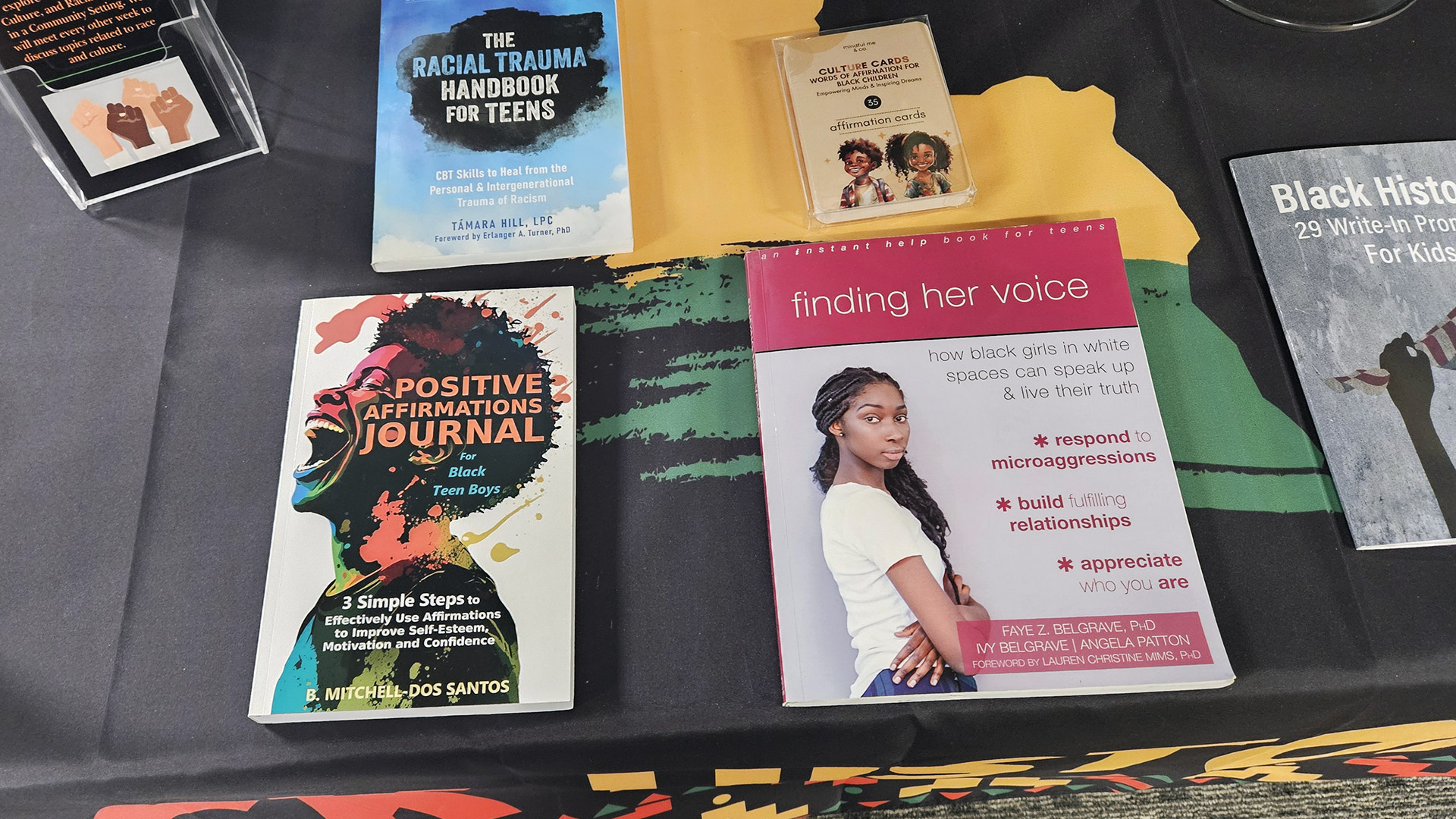
Books targeted toward Black patients sit on a table in the lobby of New Beginnings Counseling Center in Madison. The titles are one component of the clinic’s efforts to provide a welcoming environment for its clients. (Credit: Murv Seymour / PBS Wisconsin)
LB attends one-hour sessions at New Beginnings once every two weeks. Over the years, she said her entire family has taken part in mental health counseling to help cope and make sense of challenges they experience at work and at home, including racial and generational trauma.
“I think now people are saying, ‘We need to talk to somebody. We need somebody to help us with our mental health,'” said LB. “I really think it’s really becoming bigger with the racial trauma that we all are experiencing in this Madison community.”
While the wait to get mental health treatment is long, Black therapists in Madison feel encouraged to see more people reaching out for help.
“The increasing number of Black individuals seeking treatment in Madison reflects a positive trend toward greater awareness, acceptance and accessibility of mental health services. It’s a testament to the resilience and strength of our community as we continue to prioritize our mental health and well-being,” McNair said.
As a Black mental health patient, LB encourages those who are struggling with whether to seek treatment to give it a chance.
“If you feel like you need treatment, you should go get it,” she said. “And you should get it sooner rather than later, because I think treatment is just the beginning of you opening up all the trauma.”
 Passport
Passport











Follow Us